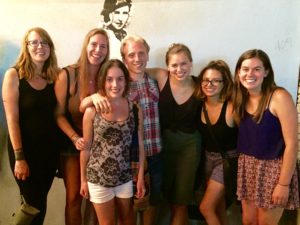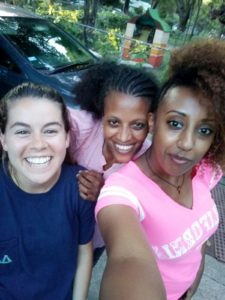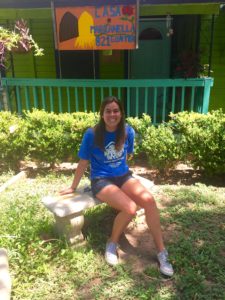Sarah Baumunk is a joint MPA/MAIR student who also interned at the U.S. Department of State’s Western Hemisphere Affairs Bureau, Office of Policy Planning in Washington, DC. She also took evening courses as part of the Maxwell-in-Washington program.
I sit on the phone on hold while trying to help an Eritrean asylee file a claim with his insurance company after a recent car wreck, when a Haitian immigrant—who only speaks French—comes to ask for help with applying for jobs. In the living room outside the office I can hear a crew of Cubans and Mexicans cheering on a soccer match together. I walk out of the office to see that a generous community member has left two giant bags of donations that need to be sifted through, but before I can get a start I’m intercepted by a group of West Africans who remind me we’re still out of vegetable oil to cook with. Once I get the extra oil and bring it into the kitchen, I’m waved down by about a dozen Ethiopians and Eritreans insisting that I come eat with them. They treat me to one of their specialties—lentils in a tomato sauces on top of injera (a typical East African spongy bread)—and we practice their English. With a full stomach, I shoo everyone off to their respective rooms just in time to make the 11 o’clock lights-out, and retreat to the office where I pull out the futon that I will sleep on that night. All in a typical day’s work while interning with Casa Marianella this summer.
Casa Marianella is a homeless shelter that provides hospitality and support for immigrants and refugees in Austin, Texas. While the nonprofit organization was originally founded 30 years ago to assist primarily Central American and Mexican immigrants, it has since evolved to encompass a much wider variety of noncitizens, with the majority coming from Eritrea, Ethiopia, and French-speaking West African countries. Casa has 38 beds to offer (although it frequently is home to many more) to residents who are either immigrants who can no longer work due to medical problems or asylees who arrive in the US and have no friends or family in our country. Residents stay for three to six months on average, while they receive legal help from pro bono lawyers and case management from staff members like myself.
Working at Casa Marianella this summer was a life-changing experience that brought practical experience to my studies, allowed me to sharpen my soft skills, and showed me what a compassion-driven organization looks like.

Over the past year, I have studied immigration policy and law through a number of Maxwell and law school courses. Given this background, I entered my position in Casa Marianella with a broad understanding of immigration in the US, but was surprised by how much I had to learn about the ground-level experience of immigrants today. From the job search for non-English speakers, to the tedious paperwork, to the hour-long drives every six months to check in with the government, working at Casa gave me valuable insight into the way our immigration laws and policies play out day-to-day.
My time at Casa was additionally an excellent practice in honing those soft skills that are so difficult to learn while sitting in a classroom. In a lot of ways, working at Casa was very similar to being a summer camp counselor. The job involved almost constant multitasking, and I quickly had to develop the ability to gently let people know they would have to wait while a more pressing issue was solved. I learned how to use a combination of enthusiasm and tough love to push our residents to do challenging things like find work, apply for an apartment, or meet with a lawyer. I saw how establishing a relationship of mutual respect and caring was essential to maintaining fruitful relationships with each resident.
Finally, Casa opened my eyes to the value of prioritizing compassion and hospitality as an organization and personally. One of the most surprising things about Casa was how willing every staff member was to go the extra mile for each person that walked through Casa’s door or called on the phone. The Executive Director Jennifer Long always described the goal of Casa as doing the most good for the most people—regardless if they are our residents or not. This attitude toward life and public service is particularly poignant in our global political climate today. As we see so much negativity being hurled at people that are different than us, Casa stands as a reminder that our world is seriously lacking in compassion—and for some groups more than others. This summer I was shown that the practice of unfettered compassion can be the most effective tool to encouraging others to become their best selves.
For more information on Casa Marianella, check out their website www.casamarianella.org and the trailer to an incredible and immersive documentary about Casa Marianella being created by Jason Outenreath: https://vimeo.com/167387279.


